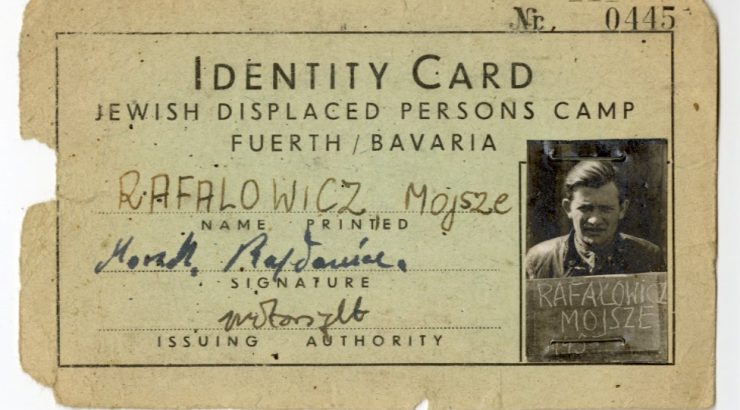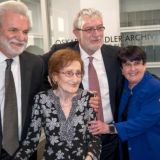
The Moshe Rafalowicz Collection
February 15, 2023
On January 13, 2020, the Oskar Schindler Archive received a donation from Mitchell Raff, whose father, Moshe Rafalowicz (Mac Raff), survived the Holocaust. Rafalowicz was born on December 12, 1919, in Sosnowiec, Poland. Before the invasion and occupation by Nazi Germany, Moshe worked as an upholster. He was liberated from Bergen-Belsen concentration camp on April 15, 1945.
The materials in this collection date from 1945 to 1957. The 12 years that separate his displaced persons camp card and his certificate of naturalization indicate the struggles of postwar displacement and statelessness for Jewish survivors of the Holocaust.
Displaced Persons Camp

Fürth Displaced Persons Camp Identity Card This identity card was issued to Moshe Rafalowicz at the Fuerth/Bavaria Displaced Persons Camp in Germany.
Following liberation from the Bergen-Belsen concentration camp, Rafalowicz went into the Jewish Displaced person camp of Fuerth/Bavaria, situated in the American-occupied zone. In the postwar era, Jewish Holocaust survivors typically could not return home. Travel was exceedingly difficult and often their homes and property had been claimed by others in their absence. In many cases, they had no family members left. Jews who tried to return home often experienced antisemitism and physical violence. However, options for immigration were limited. The Holocaust Chronicle describes the struggle that Jews experienced as they sought to escape postwar Europe and begin new lives.
“Most Jews who wanted to escape postwar Europe completely in 1945 were not able to. Britain allowed merely a trickle of legal Jewish immigration to Palestine; illegal immigration was vigorously checked. Jewish refugees hoping to reach other countries, including the United States, usually found restrictions rather than open doors” (Harran et al. 2003, 580).
The lack of immigration opportunities left many Jews in displaced persons camps. Due to concerning reports about the living conditions in these camps, President Truman appointed Earl G. Harrison to head an investigative commission and to pay specific attention to the circumstances of Jewish displaced persons. Harrison’s report to Truman described dire conditions that Jews experienced in the camps: “…Wire enclosed some of the DP camps. Food was meager, movement restricted, quarters overcrowded, and sanitation inadequate. Housed with non-Jewish DPs, including at times Nazi collaborators and former enemy prisoners…” (Harran et al. 2003, 581). In late 1945, some displaced person camps became specifically Jewish camps such as the one at Fuerth/Bavaria which held primarily Jewish survivors of the Holocaust. To learn more about displaced persons camps, visit The United States Holocaust Memorial Museum, Washington, DC website.
Temporary Travel Document

Temporary Travel Document in Lieu of Passport for Stateless Persons and Persons of Undetermined Nationality This temporary travel document was issued to Moshe Rafalowicz.
On April 21, 1950, Rafalowicz was issued a temporary travel document for stateless persons which remained valid until October 21, 1951.
Emigration
This Declaration of Intention was issued to Moshe Rafalowicz.

Certificate of Naturalization This Certificate of Naturalization was issued to Moshe Rafalowicz on March 15, 1957
On November 13, 1951, Rafalowicz emigrated to the United States from Bremen, Germany, on the ship, the General C.H. . He settled in Cincinnati, Ohio but later moved to Los Angeles, California. On March 15, 1957, he obtained U.S. citizenship through naturalization.
The Arolsen Archives
More archival materials on Moshe Rafalowicz can be found at the Arolsen Archives. Users can search for the names of victims of Nazi persecution in their online archive portal.
Visit the Oskar Schindler Archive
The Moshe Rafalowicz Collection is accessible for research at the Oskar Schindler Archive. Contact the Archivist to set up a research appointment.
Bibliography
Harran, Marilyn J., Dieter Kuntz, Russel Lemmons, Robert A. Michael, Keith Pickus, John K. Roth. 2017. Holocaust Chronicle: [History in Words and Pictures]. Illinois: Publications International.

